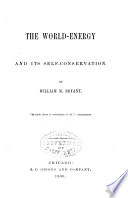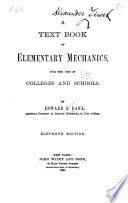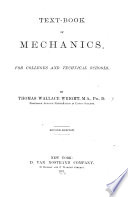 | William Thomson Baron Kelvin, Peter Guthrie Tait - Mechanics, Analytic - 1888 - 569 pages
...movenai unijormiter in directum, nisi quatenus illud a vinous impressis cogitur statum suum mutare. Every body continues in its state of rest or of uniform...straight line, except in so far as it may be compelled by force to change that state. 245. The meaning of the term Rest, in physical science Rest, is essentially... | |
 | John Lovell Robinson - Dynamics - 1888 - 378 pages
...cause is termed Force. We are now in a position to state the First Law of Motion. 90. First Law. — ' Every body continues in its state of • \ rest or...straight line except in so far as it may be compelled by force to change that state? This law expresses the fact that matter is indifferent to rest or motion... | |
 | John Greaves - Statics - 1888 - 302 pages
...Force is supplied by Newton's 1st Law, which asserts that 'Every body remains in a state of rest or of uniform motion in a straight line, except in so...compelled by impressed forces to change that state '. Force, then, is that which alters or tends to alter the state of rest or of uniform motion in a... | |
 | Edward Albert Bowser - Mechanics, Analytic - 1888 - 540 pages
...observation and experiment, and not on intuitive perception.* The laws are the following: LAW I.—Every body continues in its state of rest or of uniform motion in a straight line, except in so far as it is compelled by force to change that state. LAW II.—Change of motion is proportional to the force... | |
 | James Thompson Bixby - Religion and science - 1889 - 260 pages
...of the myriad stars of heaven, have been tested as conforming to it. The first law of motion that " every body continues in its state of rest or of uniform...compelled by impressed forces to change that state," can never be proved by induction. That a real body should move uniformly in a straight line, is contrary... | |
 | Januarius De Concilio - Apologetics - 1889 - 276 pages
...law of Kleper about motion is founded on this property of matter, and reads as follown: 'Every bpdy continues in its state of rest or of uniform motion in a straight line, except in so far as it is compelled by force to change that state.' It is explained by Prof. PG Tait, of Edinburgh: 'This... | |
 | William McKendree Bryant - Force and energy - 1890 - 336 pages
...and of its central significance. FIRST LAW OF MOTION. This law was formulated by Newton as follows: " Every body continues in its state of rest or of uniform...compelled by impressed forces to change that state." * AVe have, indeed, already developed the complete justification of this law which is absolutely universal... | |
 | Edward Salisbury Dana - Mechanics - 1881 - 320 pages
...The three laws of motion, as stated by Newton, are: (1) Every body continues in a state of rest, or of uniform motion in a straight line, except in so...compelled by impressed forces to change that state. (2) Change of motion is proportional to the impressed force, and takes place in the direction of the... | |
 | Encyclopedias and dictionaries - 1890 - 870 pages
...considered. The whole science is based upon Newton's Laws of Motion (qv), which are as follows : ( 1 ) Every body continues in its state of rest or of uniform...motion in a straight line, except in so far as it is compelled by force to change that state; (2) change of momentum is proportional to force, and takes... | |
 | Thomas Wallace Wright - Mechanics - 1890 - 276 pages
...inherent or characteristic property of matter. The law of inertia was enunciated by Newton as follows :.Every body continues in its state of rest or of...uniform motion in a straight line except in so far as it is compelled by impressed forces to change that state. It thus appears that force causes not merely... | |
| |